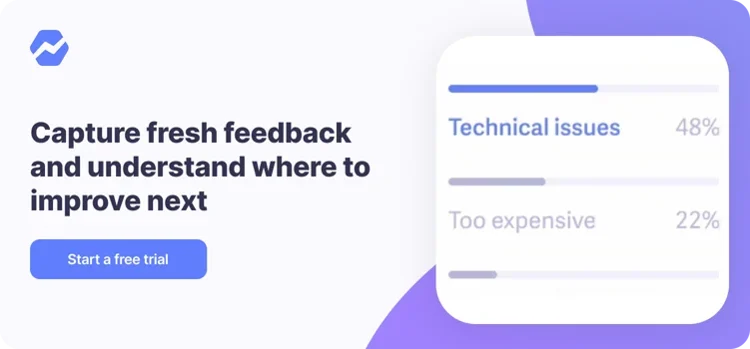Table of Contents

Bless our little founder hearts. We’re eternal optimists who have great intentions paired with a propensity to try things that common sense would say is a bad idea. That means we try a lot of things, most of which don’t pan out. But it’s the things that do pan out that keep us motivated.
Having talked to and seen the businesses of thousands of entrepreneurs, there are a few mistakes I’ve seen crop up regularly. You should always keep trying things that likely won’t pan out…but at least you can increase the chances that some of them will.
Building solutions in search of a problem
As part of the “eternal optimism” I mentioned, we tend to think just about every idea we have is great. An idea pops into our head of some cool thing to build and we instantly assume that OF COURSE there’s a market for it!
We build our “solution” based on the assumption that there’s an actual problem somewhere. It’s a solution in search of a problem.
Go check out Product Hunt on any day of the week and 99% of the stuff you see is this exact thing. Product Hunt is a directory of solutions in search of problems.
Focus on identifying problems and from there you’ll know what solutions actually need to be built. If the thing you’re building doesn’t save time, save money or create revenue, then there’s likely no problem in need of a solution.
Customer acquisition plan is just “Product Hunt”
Speaking of Product Hunt, if your entire customer acquisition plan at the start is just “get on Product Hunt” (replace “Product Hunt” with whatever popular site/person/publication you want), you’re in for a bucket of ice water on your head.
Even if you do manage to get some significant traffic from that source, it’ll be a flash in the pan. You’ve got a years-long slog ahead of you and your product isn’t going to sell itself.
Focus on sustainable and repeatable acquisition channels and you’ll win big in the long run.
Chasing the competition
Seems every week there’s some new tool to “monitor the competition”. But here’s a little secret for you: the competition does not matter.
If you’re genuinely building something that is solving a problem for your customers, the only people you should care about are your customers. Give yourself some credit. You’re uniquely equipped to solve the problems your customers have and that’s why they’re paying you.
Focus on solving the problems of the customers you have (or the customers you want to have) and what your competition is doing is at the bottom of the list of things you should care about.
Building internal tools
When you’re just getting started and you’re strapped for cash, you typically do all sorts of things to pinch pennies. It’s just part of surviving, and it’s a healthy thing to do when you’re not actually making any money. The danger, however, is keeping that mindset after you’ve got a steady stream of cash flowing.
Startups waste inordinate amounts of time building little internal tools just because they can. Especially early on. The value of time is grossly undervalued and the amount of time any given thing takes to build is grossly underestimated.
There are very few things that are worth building internally when an external tool will get you 80% of the way there.
But if you’re on the fence, throw your numbers into the Build vs. Buy Calculator and see for yourself.
Waiting too long to monetize
I got email last week from a B2B startup saying they were coming out of their “2 year free beta” and would be launching “pro plans” soon.
WHAT ON EARTH HAVE THEY BEEN DOING FOR THE PAST TWO YEARS?!?!?
Maybe they’ve been propped up on 12 rounds of VC funding, but my friends, that is categorically the worst idea anyone on the planet has ever had.
Waiting basically any amount of time to charge for your product is simply delaying the inevitable. Most people do this in the name of “getting feedback quickly” but the feedback they’re getting is worthless. Feedback from users who aren’t paying you is like asking for feedback on that new quadruple-stack burger from a vegetarian. Who cares what they think, they aren’t buying!
You aren’t running a charity. You’re running a business. If people won’t give you money for your product, you have an existential crisis on your hands and the longer you wait to find out, the worse it’ll hurt.
Charge something from day one.
Waiting too long to delegate
Most founders are some form of a jack-of-all-trades. With Baremetrics, for the first six months I did 100% of the work: design, development, marketing, support…the whole bag. But that was a mistake. I waited far too long to make my first hire.
Hone in on the things you’re really great at and hire out the rest as soon as possible.
One particular role that I think most startups wait too long to hire for is an office manager. Mark Suster actually thinks it’s a key hire, and I agree. Having an office manager/company-wide assistant frees up you and your team to get out of the minutiae and focus on the things that you are all uniquely qualified to do that makes an actual dent in the growth of your company.
Not talking to customers
I’m always surprised at how scared founders are to get on the dang phone and talk to customers. I don’t care how introverted you are or if you aren’t great at carrying on a conversation. Get over it and have a chat with other humans.
I try to schedule a call with every new Baremetrics customer as well as check in once or twice a year. The feedback you get from exchanging audible words will change your product and how you run your business because you get a level of honesty that gets distilled away with short email exchanges.
Stop what you’re doing and go email 10 customers right now and schedule a phone call.
Faking progress with busy work
Deep in the minds of most founders is the fear of rejection. Heck maybe it’s not even all that deep your mind. Maybe it’s at the forefront and it keeps you up at night. That’s normal. It’s what you do to fix it that matters, though.
What happens time and time again is we trick ourselves into thinking that random pet project or networking event or conference or Twitter exchange is real, actual, tangible, needle-moving work.
It’s not work, it’s procrastination masked as work. Real business progress happens with saying “no” to things, not “yes”. What you choose to reject defines your growth.
I’ve found having a solid routine and organizational system in place helps me avoid doing dumb things that don’t matter.
Charging too little
How much did you spend on coffee this morning? What did that fast food meal cost you? How much did that season of The Walking Dead set you back?
Entrepreneurs spend hundreds of dollars a month on completely inconsequential things yet are afraid to charge even $20 for their product that creates thousands of dollars in value for other businesses.
If you’re solving real, actual business problems, there’s no reason you can’t charge hundreds or thousands of dollars a month for it. And what’ll surprise you even more is that those customers who are paying you a lot more are almost universally more pleasant human beings.
Some of your worst and most demanding customers will be the ones paying you $5/mo. Instead of dealing with them, just charge more. A whole heck of a lot more.
You almost certainly will prefer having 1,000 $100/mo customers than 10,000 $10/mo customers.
Waiting to launch the “perfect” product
Our LinkedIn overlord, Reid Hoffman, hits the nail on the head: “If you are not embarrassed by the first version of your product, you’ve launched too late.”

There are graveyards full of startups that flopped before they even launched, all because they had the flawed idea that they needed to wait until things were “perfect”.
Wake up call: there’s no such thing as perfect software.
The longer you wait to launch your product or feature, the more assumptions you have to make, and incorrect assumptions are what kill businesses.
The first version of Baremetrics was launched in barely a week of development. It was a hot mess of basic metrics that gave you very little business insight…but it got us thousands in revenue and gave us the feedback we needed to work towards what more of our customers wanted, allowing us to grow much faster than sitting around for months or years trying to build what we’d have assumed was the right product.
Mistakes need to be made
I want to be clear: you should be making mistakes. If you play the “safe” card every time, you’ll likely lose. You have to take risks on some level. That’s just part of the game.
I think most entrepreneurs are actually risk averse. Most of us are not adrenaline junkies that do insane things because it’s fun. We take on risk because it’s necessary and we’re willing to do it in ways others aren’t.
But what you should do is look for ways to mitigate that risk. Learn from other entrepreneurs and figure how to avoid overly risky moves and focus on risk that has the proper balance of potential reward. Take smart risks and they won’t all turn out to be mistakes.
What are some mistakes you’ve made as you’ve built your business?





